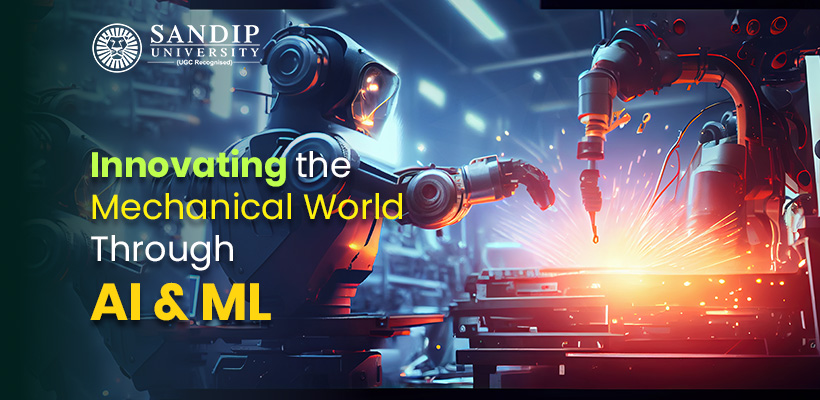In the dynamic landscape of mechanical engineering, where innovation is the cornerstone of progress, the integration of cutting-edge technologies like Machine Learning (ML) and Artificial Intelligence (AI) is more than just a passing trend, it is a transformative force that is reshaping traditional practices and driving unprecedented innovation.
As the demands of the industry evolve and the complexities of engineering challenges grow, the application of ML and AI has emerged as a vital tool for engineers seeking to push the boundaries of what is possible. In this era of rapid technological advancement, the marriage of mechanical engineering with ML and AI is not only inevitable but also essential for staying competitive in an increasingly digitised world. This is increasingly becoming the norm in top computer science and engineering colleges in Nashik that merge AI and ML with mechanical engineering to train students as per the latest trends in the industry.
By harnessing the power of data-driven decision-making and autonomous systems, engineers can unlock new levels of efficiency, accuracy, and creativity in their designs and processes. In this exploration, we will delve deeper into the innovative applications of ML and AI in mechanical engineering, examining how these technologies are revolutionising design, manufacturing, maintenance, and beyond.
From predictive analytics to generative design algorithms, the potential of ML and AI to transform every aspect of mechanical engineering is profound, offering engineers unprecedented opportunities to innovate, optimise, and excel in their field. Let us take a look at how the world of mechanical engineering can be enhanced with AI and ML:
- Generative Design Revolution
Imagine a world where the design process transcends human limitations, where algorithms generate designs that are not only functional but also optimised for performance, cost, and sustainability. ML algorithms, coupled with advanced simulation techniques, enable engineers to explore vast design spaces, uncovering novel solutions that surpass conventional approaches.
Generative design algorithms mimic natural evolutionary processes, iteratively generating and refining designs based on specified objectives and constraints. This revolutionary approach to design empowers engineers to unleash their creativity while achieving unprecedented levels of efficiency and innovation.
- Intelligent Manufacturing Ecosystems
In the era of Industry 4.0, smart manufacturing systems powered by AI are redefining the traditional factory floor. From predictive maintenance to adaptive process control, AI algorithms analyse sensor data in real-time, anticipating and mitigating potential disruptions before they occur.
Autonomous robots equipped with ML capabilities collaborate seamlessly with human workers, optimising workflows and enhancing productivity. Additive manufacturing, augmented by AI-driven algorithms, enables the production of complex geometries with unparalleled precision and efficiency. The result is a highly flexible and adaptive manufacturing ecosystem that delivers superior quality products with minimal waste and downtime.
- Personalised Product Development
The era of mass production is giving way to a new paradigm of personalised manufacturing, driven by AI-powered customisation. ML algorithms analyse vast amounts of customer data, identifying trends and preferences to inform product design and customisation options. From automotive to consumer electronics, products are tailored to meet the unique needs and preferences of individual consumers, fostering brand loyalty and customer satisfaction. Advanced manufacturing techniques, such as 3D printing and laser cutting, enable the cost-effective production of customised parts and components, revolutionising supply chain management and distribution.
- Autonomous Maintenance Systems
Also, we think about the fact that gone are the days of reactive maintenance, where equipment failures resulted in costly downtime and disruptions. AI-driven predictive maintenance systems have continuously helped in monitoring equipment health, analysing sensor data to detect early signs of wear and degradation in machine parts using the noise signature by characterising it using machine learning from life zero to life infinity.
Also, by leveraging ML algorithms, maintenance schedules are optimised based on real-time performance data, ensuring that critical assets are serviced precisely when needed. Autonomous drones equipped with AI-enabled sensors inspect infrastructure and facilities, identifying potential issues and hazards before they escalate. The result is a proactive maintenance approach that maximises uptime, extends asset lifespan, and reduces operational costs.
- Sustainable Engineering Solutions
In the quest for a greener future, the development in the ML and AI are invaluable tools for developing sustainable engineering solutions. AI algorithms optimise energy consumption in buildings and manufacturing processes, reducing carbon emissions and environmental impact. ML-driven predictive modelling enhances resource management, optimising material usage and minimising waste. From renewable energy systems to eco-friendly transportation solutions, AI enables engineers to design and implement innovative solutions that promote environmental stewardship and sustainability.
The integration of machine learning and artificial intelligence is not just a technological evolution but a paradigm shift that is revolutionising every facet of mechanical engineering. From generative design to intelligent manufacturing, personalised product development, autonomous maintenance, and sustainable engineering solutions, the possibilities are limitless. By embracing these innovative technologies, mechanical engineers can unlock new frontiers of creativity, efficiency, and sustainability, driving the industry towards a brighter and more innovative future.
Conclusion
Innovations and development in the artificial intelligence (AI) and machine learning (ML) algorithms have ignited a revolution in the mechanical engineering field, fundamentally altering the approach to problem-solving and optimisation. From design and manufacturing to maintenance and analysis, AI and ML have become indispensable tools, offering unprecedented efficiency and effectiveness in tackling complex engineering challenges.
Given the transformative impact of AI and ML, it is imperative for the best computer science colleges in Maharashtra to recognise their significance and incorporate them into the mechanical engineering curriculum. By doing so, they can ensure that students are equipped with the skills and knowledge necessary to thrive in a rapidly evolving industry.
In Maharashtra and beyond, AI and ML will serve as catalysts for innovation, enabling engineers to unlock new possibilities and achieve unprecedented levels of efficiency and performance in mechanical engineering. By embracing AI and ML, the field is poised to enter a new era of progress and advancement, shaping the future of mechanical engineering in profound ways.

